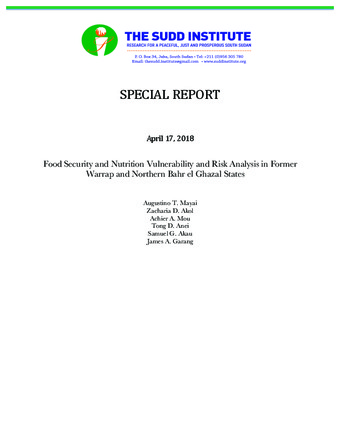Food Security and Nutrition Vulnerability and Risk Analysis in Former Warrap and Northern Bahr el Ghazal States

Authors: James Alic Garang, Samuel Garang Akau, Augustino Ting Mayai
Organization: The Sudd Institute
Type: Special Reports
Date: 18/04/2018
Publication Summary
The trends reported in the Integrated Food Security Phase Classification (IPC) show a growing food security crisis in South Sudan, with a high proportion of people sliding into crisis and emergency food insecurity level. The underlying fears concern an emerging acute lack of food in almost all parts of the country, with millions of people, many of them rural women and children, affected. At the peak of the lean season in August to September 2016, Northern Bahr el Ghazal had 72% of its population facing crisis and emergency[1] level. It should also be noted that Northern Bahr el Ghazal’s food security indicators continue to be alarming with 62% of the population being severely food insecure (phase 3,4,5) by the peak of the lean season (July)[2]. In January 2017, the Sudd Institute, with generous support from Food and Agriculture Organization (FAO) of the United Nations, explored the proximal risk factors undermining food security resilience and triggering or perpetuating emergency level vulnerabilities in the former states of Warrap and Northern Bahr el Ghazal. Examining 6 major assumptions using Participatory Rural Appraisal (PRA) tools to draw important information from rural households, the results are instructive and in direction of our expectation. They provide insights into appropriate response options for combating food security vulnerability in the region that is nearly sliding into famine. We outline the key results as follows:
James Alic Garang is a co-founder and scholar at The Sudd Institute. His areas of interest include macroeconomics, development economics, financial sector, and financial inclusion. He has in the past participated in host of academic and professional undertakings, including internships at the African Development Bank in Tunisia (2009-2010), as a lead evaluator on the Banking Sector during the “Comprehensive Evaluation of the Government of South Sudan, 2006-2010”, a consultant with the World Bank (2013-2014), and a board member serving on a number of charitable organizations and academic affiliations. A former McNair Scholar, and a member of Omicron Delta Epsilon, James holds a PhD in Economics from the University of Massachusetts, Amherst. A former Deputy Dean of Faculty of Economic & Social Studies at Upper Nile University and a Senior Economist with the Ebony Center for Strategic Studies, he is currently a Senior Advisor to the Executive Director at the IMF Executive Board in Washington, DC.
Augustino Ting Mayai's Biography
Augustino Ting Mayai is the former Managing Director of the Sudd Institute. He is a founding Research Director of the same institution, serving in this capacity for a decade. He holds a Ph.D. in Sociology, with concentrations on demography and development from the University of Wisconsin-Madison. He currently studies how state effectiveness affects child health outcomes in South Sudan and Ethiopia. Dr. Mayai has written extensively on South Sudan’s current affairs. August is the current Chair (Statistician General) of the National Bureau of Statistics, Government of South Sudan.
